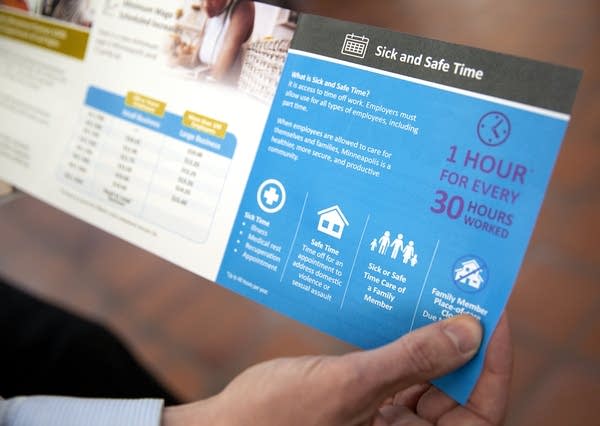Minneapolis requires paid sick time. Labor investigators make sure workers are getting it.

Go Deeper.
Create an account or log in to save stories.
Like this?
Thanks for liking this story! We have added it to a list of your favorite stories.
During a busy lunch rush in the skyway of downtown Minneapolis, a city official weaves his way to the front of the line at a sandwich shop. He asks the cashier if employees are paid when they call in sick. The employee doesn’t know.
Even though Minneapolis has had a policy requiring most businesses to provide paid sick leave for employees since 2016, some businesses haven’t complied, and knowledge of the safe and sick time benefits is scattered among workers.
That’s why Minneapolis is one of a couple dozen cities around the country that has started to aggressively enforce labor policies like minimum wage, wage theft protections and paid sick time.
The enforcement is part of a movement by labor advocates, who were frustrated by a lack of support for policies they supported at the federal level. Advocates argue that it’s all the more important to enforce because benefits like paid sick leave may help the country braces for the coronavirus pandemic.
Turn Up Your Support
MPR News helps you turn down the noise and build shared understanding. Turn up your support for this public resource and keep trusted journalism accessible to all.
A four-person Department of Labor

Minneapolis now has laws on the books around minimum wage, paid sick leave and wage theft. Advocates argue that passing the policies by themselves wouldn't have been enough. So in 2016, the city created the labor standards enforcement division, said director Brian Walsh.
“If it exists somewhere on paper, that doesn’t necessarily make it real for human beings yet, for our residents, for our workers, especially in this case, our most vulnerable lowest wage workers,” Walsh said.
He estimates that the city's small team of four is responsible for enforcing the city's labor standards for about 10,000 employers and more than 100,000 workers.
"There’s going to be a big chunk of employers that comply right off the bat,” Walsh said. “But there’s also a universe of employers that either don’t receive the information, don’t have the capacity to comply, or are in an industry where there’s pressures not to comply."
Part of Amir Malik’s job as a Minneapolis labor investigator is to do spot checks at places like restaurants to ensure they're complying with labor standards. That often involves trying to find out what the company's policies are from the workers themselves.
“Most workers, their interaction has been mostly with the health department,” said Malik, who is a trained attorney. “I think a lot of employers and employees are surprised we exist.”
Walsh said spot inspections are just one thing the labor investigators do. Last year they investigated more than 120 complaints from members of the public or workers that their rights were being violated.
"Certainly no one is reporting their boss to the government if things are going smoothly and going well and there’s no conflict,” Walsh said. “That may be a separate and different issue to whether or not the law was violated."
The employee who complains is anonymous because many workers fear retaliation for reporting their bosses for a violation.
The complaint to the division can spark an audit of the business by the labor investigators. Some business owners are upset, while others are cooperative. If the inspectors find that businesses didn't comply with labor standards, they negotiate a settlement that sometimes directly benefits the affected employees. In 2019, they recovered almost $143,000 on behalf of more than 660 workers.
Walsh estimates that about half of the division’s investigations involve the hospitality industry.
“In some industries, there are business models created around cutting corners and keeping labor costs as low as possible,” Walsh said. “Low-wage workers and vulnerable workers can come out with the short end of the stick there.”
Working while sick
The city’s labor inspectors also try to educate the public about the policies, and last year consulted with over 1,000 businesses or employees about the labor standards. One of those businesses was Taco Cat, a restaurant that delivers by bike in south Minneapolis.
Having worked in the food industry for years, co-owner Tristan Jimerson said he believes the city policies were the right thing to do.
“I worked for a company that had a very strict sick policy, where people were let go if they called in,” Jimerson said “It was just a very unpleasant place to work, and I felt like I had to work sick pretty often, which I don’t know if people realize is almost a requirement in this business.”
Providing paid sick time for employees doesn’t really cost that much more in the long run, he said, partly because healthy employees can continue to work in an industry that’s already taxing.

“I’ve learned that if you push people really hard, they can finish a shift, but most likely you’re going to have a lot of sick staff the following week,” Jimerson said. “So it’s easier to take care of people.”
Requiring all businesses to pay a higher minimum wage or provide sick time, forces all businesses to provide minimum benefits to their workers, even in very low-margin industries like restaurants, Jimerson said.
“It forces everyone to be on the same level,” Jimerson said.
Labor enforcement moves to cities
Enforcing labor standards used to be just the responsibility of the federal and state governments, said John Budd, a professor of work and organizations at the University of Minnesota’s Carlson School of Management. But as the power of labor unions declined, both in membership and in political influence, the policies supported by labor advocates stalled in Congress and in many statehouses, he said.
“Activist groups and others have turned to the city level,” Budd said. “From their perspective, they’d much rather have it at a broader level, but if they can have it at the city level, at least they’re helping some workers."
San Francisco was the first big city in the country in 2006 to pass a law requiring sick time, and to enforce it. The movement has spread, and now includes about two dozen cities, including Minneapolis, St. Paul and Duluth, despite some initial opposition from parts of the restaurant industry and business groups.
The strategy may have grown out of a movement in the late 1990s to force cities to adopt ordinances requiring businesses they contract with to pay a minimum wage, Budd said. And it may be a reaction to the fact that people working jobs in fast-food restaurants have never received very many benefits that were commonplace in other jobs.
"We could also just see this as trying to give greater respect to workers who have long been invisible,” Budd said.
Another reason for the push for cities to start enforcing labor standards may be the changing economy that now includes more gig and contract workers, said Pronita Gupta of the Center for Law and Social Policy, which advocates for policies that benefit low-income people.
“All of that has also led to a race to the bottom in many cases for cost-savings — many of these subcontractors don’t provide benefits like paid sick days, paid family medical leave, health insurance,” Gupta said. “So you’re seeing a lot more workers without this access and it has implications for their health, the economic security of their families and public health.”
She said the public often doesn't understand the effect policies, like paid sick time, have on people's lives and the public health until a crisis like the coronavirus epidemic. Health officials recommend that people wash their hands often, avoid touching their faces and stay home if they’re feeling sick.
“We shouldn't need another pandemic to remind us that these sorts of job quality measures, like paid sick days, like family medical leave, actually matter and have a huge impact on workers lives,” Gupta said. “It’s not enough to pass these laws, they also need to have that vigorous implementation and enforcement.”
Gupta pointed to Minneapolis’ enforcement program as a model of how these policies can be successfully implemented.
Minneapolis director Brian Walsh said the hope is that enforcing labor standards actually changes workplace culture in the region. He saw workers at a McDonald’s pay really close attention to an investigation of labor violations at another nearby restaurant, and then start to push for the city policies in their own workplace.
"Ultimately it’s about changing the way we think about work itself,” Walsh said. “Labor isn’t just another cost on a spreadsheet, these are people’s lives."


